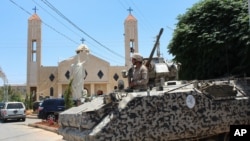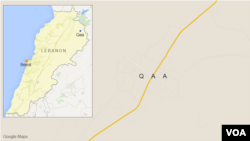Tensions are rising in Lebanon as security is stepped up in the wake of a double wave of suicide bombings near the Syrian border.
On Monday, the northeastern town of Al-Qaa was hit by two separate attacks involving eight suicide bombers within the space of a day, leaving five dead and dozens injured.
Since then, amid reports of recently-thwarted plots emerging in the wake of the blast, the government has warned that the bombings could represent a new phase of violence against a country already struggling to cope with the overspill of the Syrian war.
Meanwhile, amid the arrest and continued detention of Syrians in the region of Al-Qaa, there are fears that the blasts may worsen already strained relations between Lebanon and its refugee population.
Deadly harbinger
The small Christian town, which is just a few kilometers from the Syrian border, was initially targeted by four suicide bombers on Monday morning, killing five and wounding others.
That evening as people gathered outside a church to mourn their loved ones, four more suicide bombers blew themselves up, reportedly injuring around 20.
No one has yet claimed responsibility, but the finger is being pointed at Islamic State, which is thought to have fighters holed up in positions close by along the Lebanese-Syrian border.
Multiple reports have emerged in subsequent days of other planned bombings, including one allegedly targeting a tourist site in the Lebanese capital, Beirut, that was thwarted by security forces.
A statement released Tuesday by the Lebanese government warned, “We should not rule out that this terrorist crime is a harbinger of a wave of terrorist operations.
“It could be an indicator of a new more aggressive phase of the battle with terrorist organizations,” the statement added, “which work tirelessly to inflict harm on Lebanon and drag it into chaos and ruin.”
Monday’s blasts are the latest in a series of bombings in Lebanon since the Syrian war began in 2011, the deadliest of which killed 47 last November in Beirut’s southern suburb of Burj al Barajneh.
It is not known if the initial suicide bombers intended to target the town, or if they were disturbed before they had the chance to move elsewhere in Lebanon.
Fears of further bloodshed are running high in a country that has struggled to retain stability amid the influx of well over a million refugees and in which Hezbollah, the powerful Iran-backed Shia militia group, has fought in Syria in support of Syrian President Bashar al-Assad — a move that has polarized opinion both inside and outside Lebanon.
The bombing, which left more than 30 wounded, risks further escalating divisions, warned director of Levant Institute for Strategic Affairs Sami Nader.
“This will add more confusion into what is already a complicated situation, and could further stir up sectarian strife,” the analyst said. “It could push the country onto the edge.”
Further pressure
In the midst of a security crackdown, further pressure is likely to be piled on the refugees in Lebanon, who now make up a quarter of the overall population.
Lebanese newspaper Annahar reported that security sources claimed the attackers belonged to a 17-strong cell of militants, while other reports indicate that the army has cordoned off areas around the town and is continuing raids.
Interior Minister Nouhad Machnouk said that four of the eight bombers did not come from camps within Lebanon but from Syria itself.
Lebanon's official National News Agency (NNA) stated that 103 refugees have been arrested amid a series of raids on camps near to Al-Qaa, where funerals, postponed after the second attack, were set to take place Wednesday.
The arrests, it claimed, were for “not having legal papers,” a common problem among refugees, many of whom struggle to pay the yearly cost of renewing residency in Lebanon.
A volunteer from one of the camps, who did not wish to be identified, told VOA that many refugees were still being held, despite the fact they already had been cleared for security in the past.
“They came during the morning and started arresting people randomly,” they said.
“With every attack, [refugees'] treatment is getting worse - it's not human. I fear that things will get even more difficult in the coming days.”
With residents of Al-Qaa taking up armed patrols in response to the attack, and new curfews being imposed on refugees in the region, the town’s mayor was among politicians calling on people not to blame the local Syrian population.
Others, however, have taken a less conciliatory stance, leaving Nadim Khoury of Human Rights Watch fearful of vigilante reprisals.
“There’s danger of a reaction driven by politicians blaming Syrian refugees for the attack,” he said, adding, “We need a responsible discourse, not populist rhetoric.”





